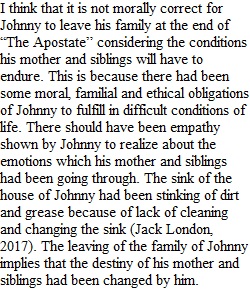


Q Select any two of the following questions and create two critical, thoughtful responses. When crafting your responses, be sure to note the title of the pieces you’re discussing. Use in-text citations from the readings to support your point of view. 1. How do London’s experiences on the road and as a worker shape the views he expresses in “How I Became a Socialist”? 2. At the end of “The Law of Life,” does Koskoosh go down with dignity, or does he just give up on life? Or does London depict Koskoosh’s death somewhere in between heroism and cowardice? Explain your view. 3. Given the conditions his mother and siblings will have to endure and given his own needs and rights as an individual, do you feel that it is morally correct for Johnny to leave his family at the end of “The Apostate”? 4. How are the descriptions and images of machines and the factory thematically significant in “The Apostate”? 5. Evaluate London’s characterization of Lucy. What does she represent for Trefethan and for you as a reader? Is she merely a male fantasy or a liberated, self-determining female, or a little of both? 6. Compose a response that makes a thoughtful and relevant connection between Lucy from “The Night-Born” and a comparable person from real life or a character from film or literature who strikes out to live a more liberated and authentic life beyond the confines of social norms. 7. Select what you feel is the most important passage in “Koolau the Leper” and discuss how it reveals the central idea or point London is making in this story. 8. “Koolau the Leper” addresses issues involving quarantine, segregation, imperial control, cultural displacement, rebellion, and refugee populations. Based on these subjects, make a connection with the thematics of “Koolau the Leper” by identifying and thoughtfully commenting on similar situations today or in recent history. Feel free to provide a link to a relevant news story. 9. What exactly does Tom King come to realize over the course of this story? 10. Select what you feel is the core passage in “A Piece of Steak” and discuss how it reveals the central idea or point London is making in this story. Does the story have a political, ethical, or biological message? 11. Explain in detail what the man lacks in comparison with the “old timer of Sulphur Creek” (wisdom) and the dog (instinct)? What are the major flaws in his character, actions, and attitudes that lead to his demise? 12. Note the sensory imagery London uses in this story to depict the environmental conditions of cold and desolation the man encounters on his trek. Find and explicate a passage that you feel best exemplifies the eco-unfriendliness of the story and explain what you think London is trying to convey about humanity’s relationship to the natural world. 13. “South of the Slot” addresses the conflicts between owners and workers, the empowered and disempowered, the wealthy and the working poor. Drawing on these conflicts, make a connection to the thematics of “South of the Slot” by identifying and thoughtfully commenting on similar situations today or in recent history. Feel free to provide a link to a relevant news story. 14. Explain how in “South of the Slot” London privileges instinct over rationality and feeling over intellect. What is “good” about “Big” Bill Totts, and how is Freddie Drummond flawed? 15. “South of the Slot” offers a case of sensual repression in Freddie Drummond. He denies his instincts, his sexuality, and his bio-Darwinian origins. What are the consequences of such denials and how might London be suggesting that recovering some of our instincts could be an asset to “civilized” life? Make your initial posts by 11:59 p.m. U.S. EST/EDT on Day 4 of Unit 2. Then, review your classmates’ posts and respond to at least three of them. Make your final posts by 11:59 p.m. U.S. EST/EDT on Day 7 of this unit.
View Related Questions